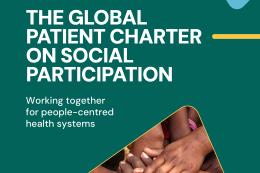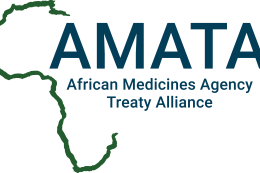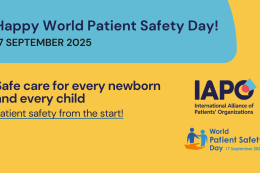Congress 2018: a step forward for the global patient movement

The 8th Global Patients Congress has been organized to look at patient engagement and patient empowerment within the healthcare value chain.
We have mapped best practice examples of patient engagement and empowerment within our alliance and multi-stakeholders. We have looked at how patients have been engaged and empowered by healthcare financiers, manufacturers, suppliers, distributors and regulators.
Participants will explore the evidence base and best practice in:
- Patient empowerment in health finance and Universal Health Coverage
- Patient empowerment in healthcare regulation
- Patient empowerment in clinical research and medicines development
- Patient empowerment within global advocacy and Pharma
Morning Sessions- 25th May
Session: Patient empowerment in health finance and Universal Health CoverageThe morning session starts with health finance. It explores patient engagement and empowerment (or the lack of) within:
- Beveridge Model-the UK National Health Service that is 70 in July this year (#NHS70)
- Semasko Model-the Poland Health System in transition post-Soviet Union
- The African health systems
- Taiwan and some newly set-up UHCs
The discussions will be conducted against the backdrop of the USA reality (Medicare, MedAid and Patient Safety and Affordable Care Act) and the European Bismarck Model.
Session: Patient empowerment in healthcare regulationThere has been a sea-change at the healthcare regulators like the US Food and Drug Administration (FDA) and European Medicines Agency (EMA); patient engagement opportunities and patient empowerment capacity building programmes are the norm now. Both these agencies will be represented and talk about patient engagement and empowerment in healthcare regulation. We will also have the New Partnership for Africa’s Development (NEPAD) from the African Union talk about their African Medicines Regulatory Harmonisation Programme (AMRH) and the African Medicines Agency.
The AU, like the European Union (EU) that hosts the EMA, was set-up to accelerate the process of integration of the 55 African economies. NEPAD was tasked to create the foundations for a new African Medicines Agency (treaty awaiting ratification) through the African Medicines Regulatory Harmonisation Programme (AMRH) that aimed to establish and improve standards and requirements related to the regulation of and access to safe, high-quality medicines for the African population.
Session: Patient empowerment in clinical research and medicines development
Perhaps the biggest change happening now is in patient engagement and empowerment within clinical and medicines/devices research and development. The attitudes within the academia and pharmaceutical research are changing. Patients have moved from:
- Being beneficiaries to partners
- Being research subjects to collaborators
- Being passengers to co-drivers of research
This is the longest session and will explore how patients are slowly colonising the research landscape. Nothing about us, without us. The session starts with the theoretical bases and evidence of patient engagement in research and then explores patient empowerment along the value-chain of research.
Patients are not only taking part as subjects, they are also determining the Research Question determining the methodology and influencing all stages of inquiry, analysis, and reporting.
Patient-Centered Outcomes Research Institute (PCORI) will then discuss how they fund research that can help patients and those who care for them make better-informed decisions about the healthcare choices they face every day, guided by those who will use that information.
The session ends with the British Medical Journal discussing future developments like the ‘patient editorial boards’ that will be part of the ‘peer review’ process in the publication and dissemination of research.
IAPO will also showcase its own initiatives like the Patient Research Exchange that aims to disseminate best practice and evidence base on patient-centricity widely amongst the patient community. IAPO’s new initiative ASPIRE (Alliance of Societal Partners Involved in Research Evolution) will be unveiled as this aims to assist ‘expert patient’ engagement in research as participants, insight providers, advisors, reviewers and co-researchers. The ultimate scenario is that in some Rare Diseases and Disorders, patients may even become funders and owners of this research. Crowd sourcing funds for research is on the rise.
Session: Patient collaboration within a multi-stakeholder environmentIAPO undertook a rapid mapping exercise to identify best practice examples of ‘collaboration’ within our stakeholding community globally. We have been sharing each other’s perspectives over a long time to get timely, accurate and pertinent information and advice from our stakeholders. This diverse insight on healthcare matters strengthens our Global advocacy to shape patient-centric and personalised healthcare. We ALL want to improve the quality, safety, availability, accessibility, acceptability, affordability and equity within healthcare.
We would like to showcase a small sample of this best practice at this session of the GPC2018 to help our members learn from this.
The International Federation of Pharmaceutical Manufacturers (IFPMA) and the two regional representative bodies the Pharmaceutical Research and Manufacturers of America (PhRMA) and FIFARMA (Latin American Federation of Pharmaceutical Industry) will introduce the session. The members of IFPMA, PhRMA and FIFARMA that we have collaborated with over the years have been (Alphabetically):
- Abbvie
- Amgen
- Bayer
- Bristol Myers Squib
- EMD Serrano (& Merck Europe)
- GSK
- Gruenthal
- Johnson and Johnson
- Jenssen
- Lilly
- Novo Nordisk
- Novartis
- Pfizer
- Roche
- Sanofi
- Takeda
- Teva
The IFPMA will open this session and provide a brief overview of what their members (the pharmaceutical companies) are doing in patient-engagement and empowerment. PhRMA and FIFARMA will add to this overview.
Janis Bernat (IFPMA) will then call upon a small sample of IFPMA members to showcase their work, and then a panel will sit to answer questions and pass comment.
Teva: Bringing the patient voice to the businessRuth Wilson (Global Head of Patient Advocacy) and her team will walk us through the Teva approach of bringing the patient voice to Teva business.
Teva has cultivated a group of expert patients that meets regularly with the Teva business teams to discuss important healthcare issues. The aim of these meetings is to share insight and collaborate. This approach provides bridging links between Teva’s internal healthcare and policy structures and the external patient communities.
At the 70th World Health Assembly, Teva brought together a group of expert patients, carers and advocates, including Professor Peter Boyle from the International Prevention Research Institute in Lyon France, to reflect on an important issue affecting patients with multiple chronic conditions and see how we can remove the siloes and align policy in the healthcare agendas.
Pfizer: Patient Board leading a cultural change within the organizationMaria-Pia Ruffilli (Senior Director International Public Affairs) will introduce her Pfizer team and initiatives.
Pfizer has assembled a Patient Advocacy Board (PAB) comprising a number of global expert patients and this PAB advocates have opened a dialogue between them and Pfizer’s internal structures, including the legal and pricing departments. A bold and innovative two-day workshop was held in New York to introduce and cement these relationships. The main aim and objective is to develop trust and understanding, and a community of practice amongst these patient experts and Pfizer’s employees so that EACH party can help contribute in shaping a new compassionate patient-centric culture within Pfizer.
Novo Nordisk
Novo Nordisk has set-up and regularly meets and holds seminars with their Disease Experience Expert Panels (DEEPs) on many disease-specific and general healthcare issues. The DEEPs comprise people living with chronic disease, or their relatives, who can provide disease-specific insights and advice based on their experience.On account of its historic links with the discovery and synthesis of insulin, Novo Nordisk has a very good disease-specific engagement with diabetic patients (type 1, 2 and 1.5 patients) within their overall umbrella approach of ‘Deep-Dive Diabetes Focus’.
GSK/ Pfizer Adult Vaccination and Antimicrobial Resistance (AMR)AMR is a big concern. Preventative vaccination programmes are being promoted heavily within the 2030 universal health coverage debate as a health finance issue and a patient-centric matter. The logic behind this is that one dollar spent on a vaccine can prevent thousands of dollars spent on acute healthcare services later. The human suffering and disabling sequela, if the patient recovers that is, can be devastating for the patient, their family and carers.
Two routes are open. Universal immunisation programmes for ALL and selective immunisation for specific populations. Both are very patient-centric public health approaches in healthcare. Every WHO Member State country has been asked by the WHO to conduct universal vaccination programmes in a race to eliminate and eradicate a number of childhood infectious diseases.
Selective immunisation programmes are now currying favour with health financiers and patient advocates for vulnerable groups of adult patients; these are people who maybe immunocompromised by a chronic underlying condition or because of their age. They succumb to infections very quickly. The strategies considered are:
- Seasonal vaccination programmes (winter flu season)
- Vaccination prior to elective surgery (to prevent hospital-acquired infection (nosocomial infection))
- ‘Booster’ vaccinations programmes (pre-exposed chickenpox cases to prevent the adult form ‘shingles’) alongside vaccinating ‘naïve’ patients.
But selective preventative vaccination programmes for the family of pneumococcal infections in the population have acquired global urgency and support worldwide; these infections can have devastating effect amongst the vulnerable groups like the young (meningitis), senior citizens (pneumonia) and hospital bound (septicaemia).
GSK and Pfizer will present together in this section, marking the great spirit of industry collaboration developed during the hunt for a vaccine against the Ebola. It was a great show of global fiduciary duty when the IFPMA members all put their shoulders behind this threat and collaborated openly with regulators to find a vaccine, and succeeded!
Side EventsThe health financers, payers and regulators start the day and would have finished their session by lunch time on 25th May 2018. We will then hold a two hour session to share the best practice as follows:
The first group of stakeholders we collaborate with are the global health regulators and international non-governmental organizations and agencies like the:
- World Health Organization (WHO) and its Patients for Patient Safety Programme ,
- Pan American Health Organization (WHO PAHO),
- NCD Alliance and
- The International Hospital Federation
The WHO will share its global patients for patient safety programme and how it has engaged and empowered patients to improve the quality and safety of their national and global healthcare



